GALLUP NEWS SERVICE
PRINCETON, NJ -- Monday marks the fifth anniversary of the September 11, 2001, terrorist attacks against the World Trade Center and the Pentagon. A recent USA Today/Gallup poll finds more than 4 in 10 Americans saying they are worried about terrorism, and half saying a terrorist attack is likely to occur in the United States during the next several weeks. Both measures show little change over the course of this year. An analysis based on yearly averages of these two questions show little change in the past three years in Americans' perceptions that a terrorist attack will occur in this country, but a slight, gradual increase over this time in Americans' terrorism concerns. Even though Republicans consistently rank terrorism as a greater problem for the country and see it as an important government priority, Republicans and Democrats do not differ in their concerns about terrorism or their perceptions that an attack on the United States is imminent.
Worry About Terrorism
The poll, conducted Aug. 18-20, 2006, finds that 45% of Americans say they are "very" (11%) or "somewhat" (34%) worried that they or a member of their family will become a victim of terrorism. A majority of Americans say they are "not too" (34%) or "not at all" (21%) worried. This poll was conducted shortly after the British government broke up a plot to blow up airplanes using liquid explosives brought on board transatlantic flights.
Gallup's Sept. 11, 2001, survey found 58% of Americans worried about being a victim of terrorism. This sentiment decreased in the weeks following the attacks, but jumped back up to 59% (the highest level of worry since 9/11) just before the United States commenced military action in Afghanistan. By November 2001, concerns about terrorism dropped to as low as 35%. Since that time, the results to this question have fluctuated substantially, ranging between 28% in January 2004 (the lowest level of worry recorded) and 48% in February 2003. More recently, since December 2005, Americans' terrorism worries have varied only slightly.
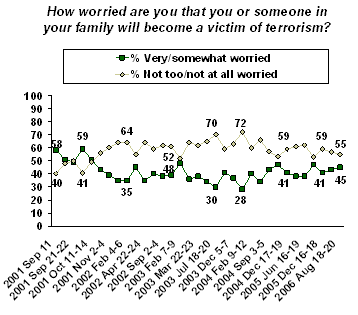
While the public's answers to this question have fluctuated over periods spanning a few months, the yearly averages show that Americans' concerns about terrorism were highest in 2001, when an average of 48% said they were worried. Average worry decreased to a low of 38% in 2003, but since then has gradually increased, averaging 44% so far this year.
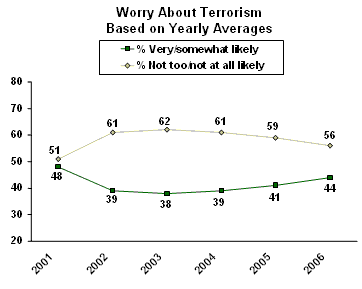
Likelihood of a Terrorist Attack
Half of Americans also tell Gallup that it is at least somewhat likely there will be a terrorist attack in the United States during the next several weeks, including 9% who say it is "very" likely. Forty-eight percent say it is "not too" (38%) or "not at all" (10%) likely.
Gallup first asked this question shortly after the 9/11 terrorist attacks, and at that time 66% of Americans said another attack was likely to occur. After the United States military campaign in Afghanistan began in early October 2001, views that a terrorist attack would occur in this country surged, reaching a highpoint of 85%. This sentiment gradually declined after that point, but a majority of Americans continued to say an attack was likely to occur until July 2003, when 40% expressed this point of view. Since then, this percentage has fluctuated between a low point of 35% in June 2005 to 57% following the London subway bombings in July 2005.
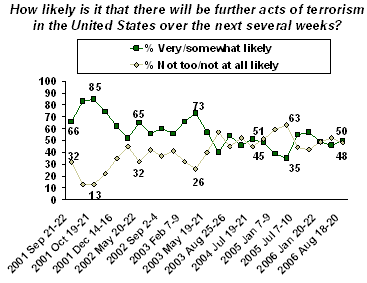
The perception of an attack occurring in the United States has been quite stable on a yearly basis, averaging 47% or 48% since 2004. It was much higher from 2001 through 2003.
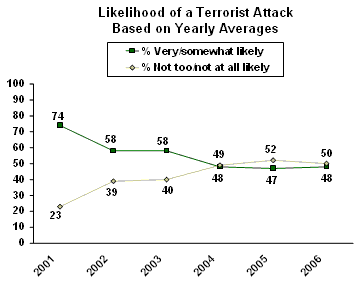
Partisan Views of Terrorism
Gallup consistently finds Republicans more likely than Democrats to say terrorism is the most important problem facing the country and also more likely to say it should be the top government priority. But, there is no difference between Republicans' and Democrats' concerns about future acts of terrorism and perceptions that another attack will occur in the United States.
Forty-six percent of both Republicans and Democrats say they are at least somewhat worried about becoming a victim of terrorism; 42% of independents feel this way. Roughly half of Republicans (49%), independents (51%), and Democrats (51%) feel it is likely a terrorist attack will occur in the United States during the next several weeks.
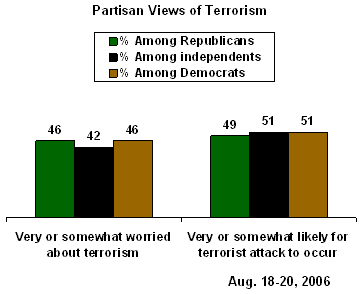
Survey Methods
The latest results are based on telephone interviews with a randomly selected national sample of 1,001 adults, aged 18 and older, conducted Aug. 18-20, 2006. For results based on this sample, one can say with 95% confidence that the maximum error attributable to sampling and other random effects is ±3 percentage points. In addition to sampling error, question wording and practical difficulties in conducting surveys can introduce error or bias into the findings of public opinion polls.
7. How worried are you that you or someone in your family will become a victim of terrorism -- very worried, somewhat worried, not too worried, or not worried at all?
|
|
Some-what worried |
|
Not |
KNOWN A VICTIM (vol.) |
|
|
|
|
|
|
|
|
|
|
|
2006 Aug 18-20 |
11 |
34 |
34 |
21 |
* |
* |
|
2006 Jan 20-22 ^ |
14 |
29 |
34 |
23 |
-- |
1 |
|
2005 Dec 16-18 |
11 |
30 |
37 |
22 |
-- |
* |
|
2005 Jul 22-24 |
14 |
33 |
30 |
23 |
* |
* |
|
2005 Jun 16-19 |
8 |
30 |
36 |
26 |
* |
* |
|
2005 Jan 7-9 |
10 |
28 |
37 |
24 |
* |
1 |
|
2004 Dec 17-19 |
13 |
28 |
34 |
25 |
* |
* |
|
2004 Oct 14-16 |
13 |
34 |
33 |
20 |
* |
* |
|
2004 Sep 3-5 ^ |
11 |
32 |
36 |
21 |
-- |
* |
|
2004 Aug 9-11 ^ |
8 |
26 |
36 |
30 |
-- |
* |
|
2004 Feb 9-12 |
10 |
30 |
36 |
24 |
* |
* |
|
2004 Jan 2-5 |
5 |
23 |
42 |
30 |
* |
* |
|
2003 Dec 5-7 |
9 |
28 |
38 |
25 |
* |
* |
|
2003 Aug 25-26 |
11 |
30 |
33 |
26 |
* |
-- |
|
2003 Jul 18-20 ^ |
6 |
24 |
38 |
32 |
* |
* |
|
2003 Apr 22-23 ^ |
8 |
26 |
39 |
26 |
* |
1 |
|
2003 Mar 22-23 |
8 |
30 |
38 |
24 |
-- |
* |
|
2003 Feb 17-19 |
8 |
28 |
33 |
31 |
* |
-- |
|
2003 Feb 7-9 ^ |
13 |
35 |
34 |
18 |
* |
* |
|
2003 Jan 23-25 |
8 |
31 |
36 |
25 |
-- |
* |
|
2002 Sep 2-4 |
8 |
30 |
37 |
25 |
* |
* |
|
2002 May 28-29 |
9 |
31 |
37 |
22 |
1 |
* |
|
2002 Apr 22-24 |
8 |
27 |
39 |
25 |
1 |
* |
|
2002 Mar 4-7 |
12 |
33 |
32 |
23 |
* |
* |
|
2002 Feb 4-6 ^ |
8 |
27 |
39 |
25 |
-- |
1 |
|
2001 Nov 26-27 |
8 |
27 |
34 |
30 |
1 |
* |
|
2001 Nov 2-4 |
11 |
28 |
34 |
26 |
-- |
1 |
|
2001 Oct 19-21 † |
13 |
30 |
33 |
23 |
* |
1 |
|
2001 Oct 11-14 † |
18 |
33 |
35 |
14 |
* |
* |
|
2001 Oct 5-6 † |
24 |
35 |
27 |
14 |
* |
* |
|
2001 Sep 21-22 † |
14 |
35 |
32 |
18 |
* |
1 |
|
2001 Sep 14-15 † |
18 |
33 |
35 |
13 |
* |
1 |
|
2001 Sep 11 † ‡ |
23 |
35 |
24 |
16 |
1 |
1 |
|
2000 Apr 7-9 ^ |
4 |
20 |
41 |
34 |
-- |
1 |
|
1998 Aug 20 ‡ ♠ |
10 |
22 |
38 |
29 |
-- |
1 |
|
1996 Jul 20-21 ‡ |
13 |
26 |
34 |
27 |
-- |
* |
|
1996 Apr 9-10 ♣ |
13 |
22 |
33 |
32 |
-- |
* |
|
1995 Apr 21-23 ♣ |
14 |
28 |
33 |
24 |
-- |
1 |
|
|
|
|
|
|
|
|
|
* Less than 0.5% |
||||||
|
^ Asked of a half sample |
||||||
|
† WORDING: How worried are you that you or someone in your family will become a victim of a terrorist attack -- very worried, somewhat worried, not too worried, or not worried at all? |
||||||
|
‡ Based on one night poll of national adults with a margin of error of ±4 pct. pts. |
||||||
|
♠ WORDING: How worried are you that someone in your family will become a victim of a terrorist attack similar to the bombing in Oklahoma City? |
||||||
|
♣ WORDING: How worried are you that you or someone in your family will become a victim of a terrorist attack similar to the bombing in Oklahoma City? |
||||||
8. How likely is it that there will be further acts of terrorism in the United States over the next several weeks -- very likely, somewhat likely, not too likely, or not at all likely?
|
|
|
Some-what likely |
|
|
|
|
% |
% |
% |
% |
% |
|
|
2006 Aug 18-20 |
9 |
41 |
38 |
10 |
2 |
|
2006 Jul 21-23 |
10 |
36 |
42 |
10 |
2 |
|
2006 Jan 20-22 ^ |
14 |
35 |
38 |
11 |
2 |
|
2005 Jul 22-24 |
12 |
45 |
32 |
10 |
1 |
|
2005 Jul 7-10 |
12 |
43 |
35 |
9 |
1 |
|
2005 Jun 16-19 |
4 |
31 |
45 |
18 |
2 |
|
2005 Jan 7-9 ^ |
8 |
31 |
44 |
15 |
2 |
|
2004 Dec 17-19 ^ |
10 |
38 |
39 |
12 |
1 |
|
2004 Jul 19-21 ^ |
12 |
39 |
34 |
11 |
4 |
|
2004 Jan 9-11 ^ |
7 |
39 |
36 |
16 |
2 |
|
2003 Aug 25-26 ^ |
10 |
44 |
35 |
10 |
1 |
|
2003 Jul 18-20 ^ |
7 |
33 |
41 |
16 |
3 |
|
2003 May 19-21 |
12 |
45 |
32 |
8 |
3 |
|
2003 Mar 22-23 |
21 |
52 |
20 |
6 |
1 |
|
2003 Feb 7-9 ^ |
16 |
50 |
23 |
9 |
2 |
|
2002 Sep 13-16 ^ |
12 |
44 |
31 |
10 |
3 |
|
2002 Sep 2-4 |
12 |
48 |
28 |
9 |
3 |
|
2002 Jul 5-8 ^ |
15 |
41 |
30 |
12 |
2 |
|
2002 May 20-22 ^ |
21 |
44 |
25 |
7 |
3 |
|
2002 Mar 8-9 ^ |
9 |
43 |
32 |
13 |
3 |
|
2001 Dec 14-16 ^ |
17 |
45 |
27 |
8 |
3 |
|
2001 Nov 2-4 ^ |
24 |
50 |
16 |
6 |
4 |
|
2001 Oct 19-21 ^ |
40 |
45 |
10 |
3 |
2 |
|
2001 Oct 7 † ‡ |
41 |
42 |
9 |
4 |
4 |
|
2001 Sep 21-22 ‡ |
22 |
44 |
24 |
8 |
2 |
|
|
|
|
|
|
|
|
^ Asked of a half sample |
|||||
|
† Polls conducted entirely in one day, such as this one, are subject to additional error or bias not found in polls conducted over several days. |
|||||
|
‡ WORDING: How likely is it that there will be further terrorist attacks in the United States over the next several weeks -- very likely, somewhat likely, not too likely, or not at all likely? |
|||||